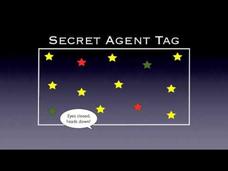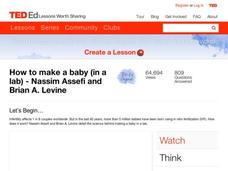Bozeman Science
Gibbs Free Energy
Energy is neither created nor destroyed, but what about free energy? Where does that fit into thermodynamics? In the video, learners explore simple the spontaneous reaction examples of enthalpy, entropy, and temperature, and then apply...
TED-Ed
Free Falling in Outer Space
How do satellites orbit the earth? Technically they are free-falling, but missing Earth's surface! Being explained in great detail and with entertaining animation, these concepts are sure to amaze your starling scientists! Another plus...
Crash Course
Economics of Education
Is going to college worth it? Address the question that nearly all high schoolers ask themselves with a helpful economics video. It discusses the economic and societal benefits of graduating from college, the reasons for increased...
ouLearn
The Invisible Hand
How did economist Adam Smith shock the world in 1776? By telling the world that the best way for a government to control an economy is to not control it, and to leave people to buy and sell freely. Use this brief video as a way to...
TED-Ed
Football Physics: The "Impossible" Free Kick
Given a particular direction and velocity, what force can make a ball swerve into a goal? This visually engaging video illustrates the physics that occur when a ball rotates on its axis while moving in a particular direction, also known...
Bozeman Science
Biology
In this biology video, the instructor introduces the four main concepts behind Biology approved by The College Board—evolution, free energy, information, and systems. Individuals then listen to and see descriptions and examples of each...
Curated OER
Big Ideas That Changed The World : Democracy (Part 3/5)
Why canÕt you plan for peace the way you plan for war? Part three explores the connections between economic power and democracy. The British Labor PartyÕs victory results in an attempt to provide free education and free health care. But...
PhysEdGames
Secret Agent Tag
Have the whole class sit down on the floor with their eyes closed. Pick a few people to be the "bad guys," which are the taggers, and a few people to be the "secret agents," which are the freers, by tapping them once or twice on the...
TED-Ed
What's the Big Deal with Gluten?
Is gluten-free just a fad? What is gluten anyway, and why can't some of us process it? This is the perfect video to break down the anatomy of gluten and the various diseases and symptoms caused by the notorious protein, as well as to...
The School of Life
Political Theory - Friedrich Hayek
Friedrich Hayek is known for his theories on the connection between economics and political science—and the way they influence each other. An informative video describes Hayek's political philosophy and his views on the importance of a...
Lesson Planet
EdTech Tuesdays: Creating a Google Apps Classroom with Kyle Brumbaugh
Have you heard about Google apps, but are uncertain about their effectiveness in the classroom? Kyle Brumbaugh, co-author of the book Creating a Google Apps Classroom: The Educator's Cookbook, discusses how these free resources can...
Lesson Planet
EdTech Tuesdays: ClassDojo
Take charge of your class with a colorful (and free) online service. Rich and Jennifer take the time to check out the features of this program. Using a sample class, they walk though how to get started and how the service's features...
PhysEdGames
Pass and Score Tag
Give two taggers a pool noodle and two freers a foam ball. If runners get tagged, then the freers must free them by throwing the ball to them. The trick is freers can't move when they throw, and runners must catch the ball to be free....
PhysEdGames
Dinosaur Prowl
Prowl like a dinosaur! Choose several students to be the dinosaurs. The dinosaurs with dodge balls are the taggers, and the Triceratops on the scooters are the freers. As the other players are tagged with balls, the Triceratops scoot...
Lesson Planet
EdTech Tuesdays: SETDA with Doug Levin
If you're interested in advocating for educational issues on a more widespread platform, such as through communications with a school board or state/national legislature, discover the workings and objectives of SETDA as described by...
Khan Academy
Introduction to the FAFSA
As many of our young learners prepare for their college education, introduce them to the Free Application for Federal Student Aid (FAFSA), a rubric for determining an estimated family contribution for a college education. The...
TED-Ed
Why Do We Pass Gas?
Flatulence is a fact of life. But what exactly is happening in our bodies that produces this excess gas? Find out with this entertaining, yet educational, video that explores the different types of bacteria that aid digestion and the...
TED-Ed
If Matter Falls Down, Does Antimatter Fall Up?
Step into the strange world of antimatter with an entertaining, yet educational physics video. Follow along to see how recent developments in physics research have allowed scientists to begin learning more about these elusive particles.
TED-Ed
How Art Can Help You Analyze
"Close study of art can train viewers to study thoroughly, analyze the elements, observe, articulate them succinctly, and formulate questions to address the seeming inconsistencies." Show your young learners how the study of art enhances...
TED-Ed
How to Make a Baby (in a Lab)
With over five million babies being born through in vitro fertilization in the last 40 years, sex education is taking on a whole new look. After first walking through natural process of reproduction, this short video goes on to explore...
Teaching Channel
Florida School for the Deaf and Blind
Learn from teachers at the Florida School for the Deaf and Blind on ways to reach students of different learning styles and ability levels, as well as how to accommodate learners with special needs in a general education classroom setting.
TED-Ed
A 3D Atlas of the Universe
Hear a lecture by Carter Emmart, director of Astrovisualization for production and education at the Rose Center for Earth and Space at the American Museum of Natural History. He introduces an astounding software that serves as a...
Lesson Planet
EdTech Tuesdays: Inkflow
Notebooks can be so much more than just a packet of paper when working with digital platforms. Jennifer and Rich introduce you to a customizable notebook app for your tablet. They show off some of the unique features of this particular...
TED-Ed
What Makes a Poem … a Poem?
What makes a poem a poem? The narrator of a short video wades into the debate with the contention that the three characteristics that poems share are musical qualities, condensed language, and intense feelings.

























